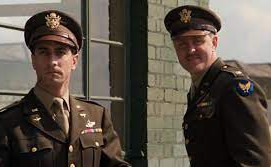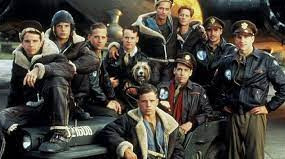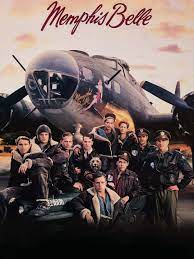The simple answer to ‘Is Memphis Belle a true story?’ is yes. The more complicated answer is that the film does not really tell the story of the mission or the crew that undertook it.
Saving Private Ryan was the first film analyzed for the thesis and nearly three thousand words were written on it and much of this was left in the final work. The parameters of analyzing fourteen films and writing a thousand words on each one had been set in stone by this stage. Yet the last few films have been somewhat lacking in content and analysis because after SPR the films were dealt with chronologically and the word limit was fast approaching by the time Memphis Belle was reached.
Now, after nearly twenty-five years there is a bit more to say. I have not seen the film in that time and do not have overly fond memories of it, which will become clear with this analysis but also knowing which films are to come.
Memphis Bell
After The Big Red One, there was a gap of ten years until the next major Second World War films were produced. This reflected the deluge of Vietnam films and the development of action movies during this period. It also represents the waning fortunes of the British film industry and Hollywood’s rise to almost complete dominance. Only Hollywood at this time could finance films that matched the spectacle of action movies.
This development of films aimed at the lowest common denominator of movie audiences proved detrimental to profound themes examined in the context of Second World War feature films. This coupled with the Vietnam War as a subject, meant there was no major film on the Second World War until Steven Spielberg’s Empire of the Sun in 1987, a film set in the East and therefore not considered here. However, in 1990, Memphis Belle showed that many stories from the Second World War had yet to appear on the big screen.
Lucky?

“They must be the ten luckiest sons of bitches in the world.” Colonel Derringer (John Lithgow) remarks.
“They’re just ordinary men Colonel.” Colonel Harriman (David Strathairn) replies.
“Are you kidding? Ordinary! First, they volunteer for this, they fly twenty-four missions without a scratch. That doesn’t sound very ordinary to me.”
Memphis Belle has been criticized for containing:
“A virtual catalogue of war movie clichés [but] ultimately provides an exciting, fictional re-enactment of the famous B-17’s final bombing raid over Germany in World War II”.
Cliche or Trope?
The film provided a catalogue of war movie clichés but in part did so to dissect and destroy them, as shown in the dialogue above. In earlier films, one main task was propaganda supporting sacrifice in the Second World War. In Memphis Belle, the film did not revolve around the twenty-four dangerous missions but rather focused on the characters’ fallibilities.

Colonel Harriman’s disagreement with Colonel Dallinger’s contention that the crew are lucky describes the essence of this film. Earlier films would have portrayed the story of Memphis Belle, glorifying their deeds, whereas it is implied in the film that the deeds were terrible but necessary. Continuing in this vein, the film also implies that their survival on dangerous bombing missions is more important than any factors that glorify the pursuit of war.
The mission
The film begins on the eve of Memphis Belle’s final mission. The young veteran crew waiting for their last mission witness the demise of a B-17 as its landing gear fails. That evening, at the air-base dance, Colonel Dallinger, the newly arrived Public Relations officer mistakenly congratulates the crew by shouting to the assembled masses to join in three cheers, an action deemed bad luck for any flight crew.
Having failed to ingratiate himself with Colonel Harriman this subsequent act alienates him from the entire crew. This character is created as an embodiment of the clichés from earlier Second World War films. The crew and their colonel are therefore the realistic antithesis of this character.
The film continues to develop clichés through the Colonel Dallinger character, which are then destroyed by the crew and Colonel Harriman. The crew takes the news that their last mission will involve attacking heavily defended Bremen with signs of dread. For example, Phil Longthorn (D.B. Sweeny) the navigator is terrified, whereas others, such as Val (Billy Zane) feign boyish bravado.
Party Time
The most scared is Colonel Harriman who though not on the mission is continually disheartened as he sends as he sends young men on such missions. He becomes angry and exasperated with Dallinger who has organized a surprise welcome home party for the crew. Dallinger only cares about the story. Harriman drags Dallinger away and forces him to read letters which he has received from grieving relatives of those men who died while under his command. Dallinger, whilst reading begins to have a change of heart as the full reality of these missions and their human cost is made clear to him.
Having developed this anti-war sentiment, the film reverts to cliché during much of the mission. The target, a factory, is covered in smoke and Captain Dearborn (Matthew Modine) decides to fly around again risking further danger.
It all starts to go wrong
Thus begins a series of calamities beginning with Danny (Eric Stoltz) being injured and culminating in the failure of the undercarriage, the same fateful situation witnessed earlier in the film. Fortunately, they manage to hand-lower the wheel and the Memphis Belle lands safely, and Danny wakes up.

Final thoughts
The film should be congratulated for using real B17s some of which were adapted to appear to be the correct period models, unfortunately, the same care was not taken with the P-51 Mustangs which were unadapted later models.
The story is based on a real crew but that is about as far as the reality goes. The mission is made up and the characters a generic war film characters and bear little resemblance to the real crew. This may be critical, but as I have mentioned in an earlier blog, the premise of Saving Private Ryan is based upon even less historical information.
I guess what is important is what is done with the premise, no matter how thin, and what is the message of the film. Unfortunately, the trope-filled story of Memphis Belle does not lend itself to doing this convincingly. At least they use the term ‘bail out’ rather than ‘eject’ as the BBC’s World on Fire did.
Next up for analysis is Schindler’s List
Happy listening, watching, and reading folks.
All the best
BigT
